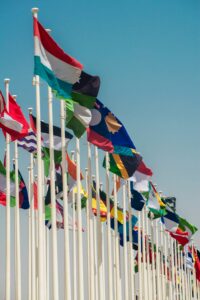
Last month, in the United Nations Security Council, the United States vetoed a draft resolution authored by Brazil, which called for a “humanitarian pause” in Gaza and “strongly urges the continuous, sufficient and unhindered provision of essential goods and services to civilians.”
In a vote taken by the Security Council, 12 Member States voted in favor of passage, two abstentions were taken by the United Kingdom and Russian Federation, and one vote was recorded as against with the United States invoking its veto power.
The vetoed draft resolution also called for the unconditional release of all hostages taken by Hamas in the attacks on Israel on Oct. 7, 2023. In a comment by US Ambassador to the United Nations, Linda Thomas-Greenfield, after the Security Council vote, she clarified to reporters the United States’ stance on the resolution. Thomas-Greenfield said, “Colleagues, the United States is disappointed this resolution made no mention of Israel’s right of self-defense.”
She then reassured other nations on the Security Council that while the United States was unable to support the resolution as presented, “On the humanitarian front, [United States] are working with Israel, its neighbors, the United Nations, and other partners to address the humanitarian crisis in Gaza. It is critical that food, medicine, water, and fuel begin flowing into Gaza as soon as possible.”
During a Nov. 3 visit to Tel Aviv, as reported in an article by Reuters, Secretary of State Anthony Blinken urged Israeli Prime Minister Benjamin Netanyahu for “Israel to temporarily stop its military offensive on Gaza to allow for aid to enter the Palestinian enclave but faced pushback from Prime Minister Benjamin Netanyahu who rejected any such halt unless hostages held by Hamas militants are freed.”
The purpose of the United Nations Security Council, as stated on their website, is to “maintain international peace and security.” Adding on, “The Security Council takes the lead in determining the existence of a threat to the peace or act of aggression. It calls upon the parties to a dispute to settle it by peaceful means and recommends methods of adjustment or terms of settlement.“
UCR Professor of Political Science Dr. Paul D’Anieri elaborates that “The Security Council has 15 members. Five (China, France, Russia, the United Kingdom and the United States) [colloquially referred to as the P5] are permanent members with the right to veto any resolution. Ten other members are elected by the General Assembly and serve 2-year terms. The presidency of the Security Council, which is essentially the chair, rotates monthly.”
This refers to UN Charter Article 27, which outlines that any decisions of substantive matters such as a ceasefire must include “the concurring votes of the permanent members.” The permanent members, P5, were given a “special voting power known as the ‘right to veto.’ It was agreed by the drafters that if any one of the five permanent members cast a negative vote in the 15-member Security Council, the resolution or decision would not be approved.”
With China assuming the presidency of the Security Council for the month of November, it will come with the power to set the agenda of the Security Council and decide the topics that they will discuss. China voted in favor of Brazil’s ceasefire resolution but against the United States version, which discussed a similar topic and mentioned Israel’s right to self-defense. The new Security Council President, Zhang Jun, in a Security Council press conference, promised to prioritize “urgent and meaningful action to address the ongoing conflict in Gaza.”







